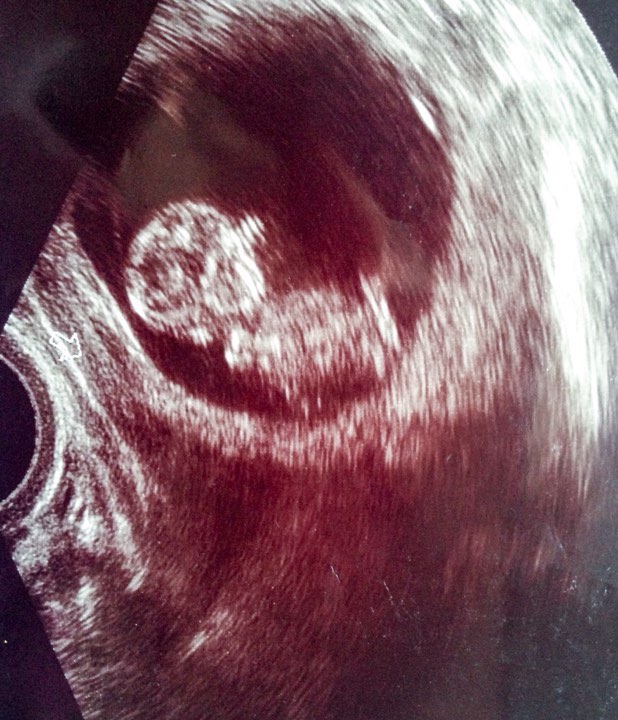(Editor’s note: This is the first post in a three-part series about giving birth abroad. Laura already is getting inquiries about English-speaking gynaecologists, so here’s a link to a list.)

LAURA KAYE SAVOURS HER ALCOHOL-FREE ERDINGER. GERMANY HAS NO SHORTAGE OF ALCOHOL-FREE BEERS FROM WHICH EXPECTANT MUMS CAN CHOOSE.
For as long as we have been together, my husband and I have been on the move. In the 13 years since we met, we have lived in eight different locations in five different countries on three different continents.
We are serial expats, and seasoned travellers. So when my husband bagged himself a new job opportunity in Berlin, a mere 2-hour flight from our home country of the United Kingdom, we were decidedly unfazed by the move.
This was going to be easy!
Then, just eight days after arriving, we found out I was pregnant ….
Now I’ll preface this by saying that this hadn’t come as a complete surprise. We had been trying for a baby in the months before we’d moved.
The idea of a more family-friendly city had even factored into our decision to take the job in Berlin in the first place. But there’s nothing that brings you hurtling back down to earth (in whatever country you might find yourself) quite like a positive pregnancy test.
So, there we were, in temporary accommodation in a country I’d never even visited before with basically no understanding of the language or the healthcare system, and a baby growing inside me that was apparently already the size of a lentil. Eeeek!
What followed was a crash course in Krankenkasse (health insurance), Frauenärzten (Gynocologists), Hebammen (midwives), Krankenhäusern (hospitals), and Geburtshäusern (birth houses/birth centres).
Needless to say, this scenario left little room for sampling the famous Berlin night life we had heard so much about.
Getting to grips with prenatal care
As I said, we were no strangers to expat life, and travelling to the degree we have has required navigating a few different healthcare systems from time to time. We’d braved Dengue Fever in East Timor, food poisoning in the Philippines, dental care in Hungary, a miscarriage in the U.S., some kind of mystery waterborne disease in Guatemala, an ear infection in Gaza ….
Nothing could surprise us at this point, right?
Through the help of Google, we located an English-speaking gynaecologist willing to take me on as a new patient. I turned up at my first appointment, excited to find out about our baby (who had now progressed up the “food size chart” to: olive).
Now owing to an earlier pregnancy that had sadly ended in miscarriage, I was no stranger to prenatal appointments. I had previously been pregnant in the United States just a few months prior to this, so I thought I knew the drill.
Baby exam in the U.S. vs. baby exam in Germany
 In the U.S., I had been shown into a very private room for my first prenatal examination. I was given special pyjamas to change into behind a screen, and a soothing voice explained to me exactly what would happen during the examination.
In the U.S., I had been shown into a very private room for my first prenatal examination. I was given special pyjamas to change into behind a screen, and a soothing voice explained to me exactly what would happen during the examination.
Calming music played.
Beautiful artwork and large screens for viewing ultrasound images lined the walls.
I was examined in my special pyjamas, with an additional blanket to protect my modesty. In hindsight, I have no idea how she managed to examine me at all with all that faff.
My experience in Germany could not have been more different.
After the obligatory peeing in a cup, I was called in to see the doctor after a mere 30-minute wait (record timing for back home in the UK, but a far cry from my VIP experience in the U.S.). “OK, let’s have a look… Take off all your clothes from the waist down and sit in that chair with your feet in the stirrups” she said, abruptly.
No privacy screen, no special pyjamas, not even a blanket.
Five minutes later, a nurse nonchalantly popped in to ask the doctor a question whilst I sat there baring all. People are considerably more body-confident in Germany than in other places I’ve lived, and most of the Germans I know have little to no issue with nudity, particularly when it is necessary for medical examinations.
Medicine, rather than ‘modesty’, is the aim of the game during doctor’s appointments.
This may come as a bit of a surprise to women from places like the U.K. or U.S, or anywhere else where people have a weird deep-rooted fear of their own naked body.
There was no soothing music or big screens on the wall this time, but instead a small old monitor. And there on that monitor was our baby, measuring right on track.
“Baby looks perfect,” she said with a smile.
Next time in Part 2:
Learning German whilst pregnant, and missing family and friends.
 About the author:
About the author:
Originally from the U.K., Laura Kaye currently lives with her family in Berlin. Having left the U.K. in 2009 to pursue a career in the humanitarian and development sector, she has since lived and worked in multiple countries across three continents. Laura moved with her husband in 2014 and is currently taking a career break to raise their 3-year-old son.
More posts by Laura Kaye
An open letter to the undecided: ‘My family is right at the heart of the EU membership vote’
Laura Kaye is a freelance writer, researcher and editor. Her work focuses on social and development issues, parenting and family life.
Originally from the Wirral in the United Kingdom, she is a serial expat now happily living in Berlin, Germany.















